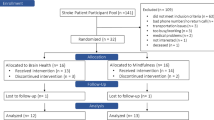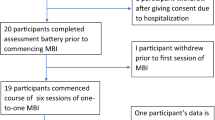Abstract
Caring for people with dementia (PWD) poses a lot of challenges to family caregivers. Mindfulness-based intervention (MBI) is a newly adopted psychosocial intervention through an integration of the mind and body to reduce stress of the participants (caregivers). This study aims to determine whether and to what extent MBI for family caregivers of PWD can reduce their stress. Electronic databases including MEDLINE, CINAHL, Cochrane Library, PsycINFO, EMBASE, and the Web of Science were searched for relevant studies published between 1990 and 2016. All randomized controlled trials (RCTs) and quasi-experimental studies evaluating the effects of MBI on reducing stress in family caregivers of PWD were eligible for inclusion in this review. Five studies were included. Of these, three trials involving 144 participants were eligible for the meta-analysis. The analysis showed that stress levels dropped significantly after the MBI. The findings showed a significantly more favorable effect of MBI with the standardized mean difference with a moderate aggregated effect size of 0.57 (95% CI [0.23, 0.92], overall effect Z = 3.25 at p = 0.001). This effect was only found immediately after the MBI but not in the follow-up sessions. In conclusion, the available evidence suggests that MBI seems to be effective at reducing stress among family caregivers of PWD. However, it should be noted that the number of studies involved was small (n = 5), as were the sample sizes, and no sustained effect was found. Multi-center RCTs of the effects of MBI involving larger and more diverse samples of family caregivers of PWD are recommended before any clear conclusion can be reached.





Similar content being viewed by others
References
Adelman, R. D., Tmanova, L. L., Delgado, D., Dion, S., & Lachs, M. S. (2014). Caregiver burden: a clinical review. Journal of the American Medical Association, 311(10), 1052–1060. doi:10.1001/jama.2014.304.
Baer, R. A., Smith, G. T., & Allen, K. B. (2004). Assessment of mindfulness by self-report: the Kentucky Inventory of Mindfulness Skills. Assessment, 11(3), 191–206. doi:10.1177/1073191104268029.
Baer, R. A., Smith, G. T., Lykins, E., Button, D., Krietemeyer, J., Sauer, S., et al. (2008). Construct validity of the five facet mindfulness questionnaire in meditating and nonmeditating samples. Assessment, 15(3), 329–342. doi:10.1177/1073191107313003.
Bazzano, A., Wolfe, C., Zylowska, L., Wang, S., Schuster, E., Barrett, C., & Lehrer, D. (2015). Mindfulness based stress reduction (MBSR) for parents and caregivers of individuals with developmental disabilities: a community-based approach. Journal of Child and Family Studies, 24(2), 298–308. doi:10.1007/s10826-013-9836-9.
Beck, A. T., & Dozois, D. J. A. (2011). Cognitive therapy: current status and future directions. Annual Review of Medicine, 62(1), 397–409. doi:10.1146/annurev-med-052209-100032.
Birnie, K., Garland, S. N., & Carlson, L. E. (2010). Psychological benefits for cancer patients and their partners participating in mindfulness-based stress reduction (MBSR). Psycho-Oncology, 19(9), 1004–1009. doi:10.1002/pon.1651.
Brown, K. W., Coogle, C. L., & Wegelin, J. (2015). A pilot randomized controlled trial of mindfulness-based stress reduction for caregivers of family members with dementia. Aging & Mental Health, 1–10. doi:10.1080/13607863.2015.1065790.
Brown, K. W., & Ryan, R. M. (2003). The benefits of being present: mindfulness and its role in psychological well-being. Journal of Personality and Social Psychology, 84(4), 822–848. doi:10.1037/0022-3514.84.4.822.
Carlson, L. E., Speca, M., Faris, P., & Patel, K. D. (2007). One year pre–post intervention follow-up of psychological, immune, endocrine and blood pressure outcomes of mindfulness-based stress reduction (MBSR) in breast and prostate cancer outpatients. Brain, Behavior, and Immunity, 21(8), 1038–1049. doi:10.1016/j.bbi.2007.04.002.
Chan, W. C., Ng, C., Mok, C. C., Wong, F. L., Pang, S. L., & Chiu, H. F. (2010). Lived experience of caregivers of persons with dementia in Hong Kong: a qualitative study. East Asian Archives of Psychiatry, 20(4), 163–168 Retrieved from: http://easap.asia/journal_file/1004_V20N4_p163.pdf.
Chen, Y., Yang, X., Wang, L., & Zhang, X. (2013). A randomized controlled trial of the effects of brief mindfulness meditation on anxiety symptoms and systolic blood pressure in Chinese nursing students. Nurse Education Today, 33(10), 1166–1172. doi:10.1016/j.nedt.2012.11.014.
Chien, L. Y., Chu, H., Guo, J. L., Liao, Y. M., Chang, L. I., Chen, C. H., & Chou, K. R. (2011). Caregiver support groups in patients with dementia: a meta-analysis. International Journal of Geriatric Psychiatry, 26(10), 1089–1098. doi:10.1002/gps.2660.
Chien, W. T., & Thompson, D. R. (2014). Effects of a mindfulness-based psychoeducation programme for Chinese patients with schizophrenia: 2-year follow-up. The British Journal of Psychiatry, 205(1), 52–59. doi:10.1192/bjp.bp.113.134635.
Chiesa, Calati, R., & Serretti, A. (2011). Does mindfulness training improve cognitive abilities? A systematic review of neuropsychological findings. Clinical Psychology Review, 31(3), 449–464. doi:10.1016/j.cpr.2010.11.003.
Chiesa, A. (2012). The difficulty of defining mindfulness: current thought and critical issues. Mindfulness, 4(3), 255–268. doi:10.1007/s12671-012-0123-4.
Churchill, R., Moore, T. H., Davies, P., Caldwell, D., Jones, H., & Lewis, G. (2010). Mindfulness-based ‘third wave’ cognitive and behavioural therapies versus treatment as usual for depression. Cochrane Database Systematic Reviews. doi:10.1002/14651858.cd008705.
Cohen, S., Tom, K., & Robin, M. (1983). A global measure of perceived stress. Journal of Health and Social Behavior, 24(4), 385–396. doi:10.2307/2136404.
Epstein-Lubow, G., McBee, L., Darling, E., Armey, M., & Miller, I. W. (2011). A pilot investigation of mindfulness-based stress reduction for caregivers of frail elderly. Mindfulness, 2(2), 95–102. doi:10.1007/s12671-011-0047-4.
Ferrara, M., Langiano, E., Di Brango, T., Di Cioccio, L., Bauco, C., & De Vito, E. (2008). Prevalence of stress, anxiety and depression in with Alzheimer caregivers. Health and Quality of Life Outcomes, 6(1), 13. doi:10.1186/1477-7525-6-93.
Garland, E., Gaylord, S., & Fredrickson, B. (2011). Positive reappraisal mediates the stress-reductive effects of mindfulness: an upward spiral process. Mindfulness, 2(1), 59–67. doi:10.1007/s12671-011-0043-8.
Garland, E., Gaylord, S., & Park, J. (2009). The role of mindfulness in positive reappraisal. Explore: The Journal of Science and Healing, 5(1), 37–44. doi:10.1016/j.explore.2008.10.001.
Gonzalez, E. W., Polansky, M., Lippa, C. F., Gitlin, L. N., & Zauszniewski, J. A. (2014). Enhancing resourcefulness to improve outcomes in family caregivers and persons with Alzheimer's disease: a pilot randomized trial. International Journal of Alzheimer's Disease, 2014. doi:10.1155/2014/323478.
Gu, J., Strauss, C., Bond, R., & Cavanagh, K. (2015). How do mindfulness-based cognitive therapy and mindfulness-based stress reduction improve mental health and wellbeing? A systematic review and meta-analysis of mediation studies. Clinical Psychology Review, 37, 1–12. doi:10.1016/j.cpr.2015.01.006.
Higgins, J. P., Altman, D. G., Gøtzsche, P. C., Jüni, P., Moher, D., Oxman, A. D., et al. (2011). The Cochrane Collaboration’s tool for assessing risk of bias in randomised trials. British Medical Journal, 343, d5928. doi:10.1136/bmj.d5928.
Higgins, J. P., Thompson, S. G., Deeks, J. J., & Altman, D. G. (2003). Measuring inconsistency in meta-analyses. British Medical Journal, 327(7414), 557–560. doi:10.1136/bmj.327.7414.557.
Hofmann, S. G., Asnaani, A., Vonk, I. J. J., Sawyer, A. T., & Fang, A. (2012). The efficacy of cognitive behavioral therapy: a review of meta-analyses. Cognitive Therapy and Research, 36(5), 427–440. doi:10.1007/s10608-012-9476-1.
Hölzel, B. K., Lazar, S. W., Gard, T., Schuman-Olivier, Z., Vago, D. R., & Ott, U. (2011). How does mindfulness meditation work? Proposing mechanisms of action from a conceptual and neural perspective. Perspectives on Psychological Science, 6(6), 537–559. doi:10.1177/1745691611419671.
Hou, R. J., Wong, S. Y. S., Yip, B. H. K., Hung, A. T., Lo, H. H. M., Chan, P. H., et al. (2014). The effects of mindfulness-based stress reduction program on the mental health of family caregivers: a randomized controlled trial. Psychotherapy and Psychosomatics, 83(1), 45–53. doi:10.1159/000353278.
Jain, S., Shapiro, S. L., Swanick, S., Roesch, S. C., Mills, P. J., Bell, I., & Schwartz, G. E. (2007). A randomized controlled trial of mindfulness meditation versus relaxation training: effects on distress, positive states of mind, rumination, and distraction. Annals of Behavioral Medicine, 33(1), 11–21. doi:10.1207/s15324796abm3301_2.
Jimenez, S. S., Niles, B. L., & Park, C. L. (2010). A mindfulness model of affect regulation and depressive symptoms: positive emotions, mood regulation expectancies, and self-acceptance as regulatory mechanisms. Personality and Individual Differences, 49(6), 645–650. doi:10.1016/j.paid.2010.05.041.
Kabat-Zinn, J. (1990). Full catastrophe living: using the wisdom of your body and mind to face stress, pain, and illness. New York, NY: Delacorte Press.
Lau, M. A., Bishop, S. R., Segal, Z. V., Buis, T., Anderson, N. D., Carlson, L., et al. (2006). The Toronto mindfulness scale: development and validation. Journal of Clinical Psychology, 62(12), 1445–1467. doi:10.1002/jclp.20326.
Laver, K., Milte, R., Dyer, S., & Crotty, M. (2016). A systematic review and meta-analysis comparing carer focused and dyadic multicomponent interventions for carers of people with dementia. Journal of Aging and Health. Advance online publication. doi:10.1177/0898264316660414.
Lazarus, R. S., & Folkman, S. (1984). Stress, appraisal, and coping. New York, NY: Springer.
Livingston, G., Barber, J., Rapaport, P., Knapp, M., Griffin, M., King, D., et al. (2013). Clinical effectiveness of a manual based coping strategy programme (START, STrAtegies for RelaTives) in promoting the mental health of carers of family members with dementia: pragmatic randomised controlled trial. British Medical Journal, 347, f6276. doi:10.1136/bmj.f6276.
Lynch, D., Laws, K. R., & McKenna, P. J. (2010). Cognitive behavioural therapy for major psychiatric disorder: does it really work? A meta-analytical review of well-controlled trials. Psychological Medicine, 40(01), 9–24. doi:10.1017/S003329170900590X.
Maayan, N., Soares-Weiser, K., & Lee, H. (2014). Respite care for people with dementia and their carers. Cochrane Database of Systematic Reviews. doi:10.1002/14651858.CD004396.pub3.
McDowell, I. (2006). Measuring health: a guide to rating scales and questionnaires. Oxford: Oxford University Press.
McNair, D. M., Lorr, M., & Droppleman, L. F. (1971). Manual for the profile of mood states. San Diego, CA: Educational and Industrial Testing Services.
Minor, H. G., Carlson, L. E., Mackenzie, M. J., Zernicke, K., & Jones, L. (2006). Evaluation of a mindfulness-based stress reduction (MBSR) program for caregivers of children with chronic conditions. Social Work in Health Care, 43(1), 91–109. doi:10.1300/J010v43n01_06.
Montgomery, R. J., Borgatta, E. F., & Borgatta, M. L. (2000). Societal and family change in the burden of care. In W. T. Liu (Ed.), Who should care for the elderly (pp. 27–54). Singapore: Singapore University Press, National University of Singapore.
Morone, N. E., Greco, C. M., & Weiner, D. K. (2008). Mindfulness meditation for the treatment of chronic low back pain in older adults: a randomized controlled pilot study. Pain, 134(3), 310–319. doi:10.1016/j.pain.2007.04.038.
O'Donnell, R. M. M. (2013). Mindfulness-based stress reduction as an intervention among family caregivers of persons with neurocognitive disorders. (Unpublished dissertation) The University of Arizona, US.
Oken, B. S., Fonareva, I., Haas, M., Wahbeh, H., Lane, J. B., Zajdel, D., & Amen, A. (2010). Pilot controlled trial of mindfulness meditation and education for dementia caregivers. Journal of Alternative & Complementary Medicine, 16(10), 1031–1038. doi:10.1089/acm.2009.0733.
Paller, K. A., Creery, J. D., Florczak, S. M., Weintraub, S., Mesulam, M. M., Reber, P. J., et al. (2015). Benefits of mindfulness training for patients with progressive cognitive decline and their caregivers. American Journal of Alzheimer's Disease & Other Dementias, 30(3), 257–267. doi:10.1177/1533317514545377.
Pinquart, M., & Sörensen, S. (2006). Helping caregivers of persons with dementia: which interventions work and how large are their effects? International Psychogeriatrics, 18(4), 577–595. doi:10.1017/S1041610206003462.
Salzer, S., Winkelbach, C., Leweke, F., Leibing, E., & Leichsenring, F. (2011). Long-term effects of short-term psychodynamic psychotherapy and cognitive-behavioural therapy in generalized anxiety disorder: 12-month follow-up. Canadian Journal of Psychiatry, 56(8), 503–508. doi:10.1177/070674371105600809.
Schulz, R., & Martire, L. M. (2004). Family caregiving of persons with dementia: prevalence, health effects, and support strategies. The American Journal of Geriatric Psychiatry, 12(3), 240–249. doi:10.1097/00019442-200405000-00002.
Segal, Z. V., Williams, J. M. G., & Teasdale, J. D. (2002). Mindfulness-based cognitive therapy for depression: a new approach to preventing relapse. New York: Guilford Press.
Shapiro, S. L., & Carlson, L. E. (2009). Mindfulness and self-care for clinicians. In S. L. Shapiro & L. E. Carlson (Eds.), The art and science of mindfulness: integrating mindfulness into psychology and the helping professions (pp. 107–117). Washington, D.C.: American Psychological Association. doi:10.1037/11885-008.
Sörensen, S., Pinquart, M., & Duberstein, P. (2002). How effective are interventions with caregivers? An updated meta-analysis. Gerontologist, 42(3), 356–372. doi:10.1093/geront/42.3.356.
Spielberger, C. D., & Gorsuch, R. L. (1983). State-trait anxiety inventory for adults : sampler set, manual, test, scoring key. Palo Alto, CA: Mind Garden.
Stratford, H. J., Cooper, M. J., Di Simplicio, M., Blackwell, S. E., & Holmes, E. A. (2014). Psychological therapy for anxiety in bipolar spectrum disorders: a systematic review. Clinical Psychology Review, 35c, 19–34. doi:10.1016/j.cpr.2014.11.002.
Tanay, G., & Bernstein, A. (2013). State mindfulness scale (SMS): development and initial validation. Psychological Assessment, 25(4), 1286–1299. doi:10.1037/a0034044.
Tremont, G. (2011). Family caregiving in dementia. Medicine and Health, Rhode Island, 94(2), 36–38 Retrieved from: http://www.ncbi.nlm.nih.gov/pmc/articles/PMC3487163/.
Waldemar, G., Dubois, B., Emre, M., Georges, J., McKeith, I. G., Rossor, M., et al. (2007). Recommendations for the diagnosis and management of Alzheimer's disease and other disorders associated with dementia: EFNS guideline. European Journal of Neurology, 14(1), e1–e26. doi:10.1111/j.1468-1331.2006.01605.x.
Whitebird, R. R., Kreitzer, M., Crain, A. L., Lewis, B. A., Hanson, L. R., & Enstad, C. J. (2013). Mindfulness-based stress reduction for family caregivers: a randomized controlled trial. Gerontologist, 53(4), 676–686. doi:10.1093/geront/gns126.
Wilz, G., & Kalytta, T. (2012). Evaluation of a cognitive-behavioral group intervention for family caregivers of persons with dementia. Psychotherapie, Psychosomatik. Medizinische Psychologie., 62(9–10), 359–366. doi:10.1055/s-0032-1312657.
Yesavage, J. A., & Sheikh, J. I. (1986). 9/Geriatric depression scale (GDS) recent evidence and development of a shorter version. Clinical Gerontologist, 5(1–2), 165–173. doi:10.1300/J018v05n01_09.
Zainuddin, J., Arokiasamy, J. T., & Poi, P. J. (2003). Caregiving burden is associated with short rather than long duration of care for older persons. Asia Pacific Journal of Public Health, 15(2), 88–93. doi:10.1177/101053950301500203.
Zarit, S. H., Reever, K. E., & Bach-Peterson, J. (1980). Relatives of the impaired elderly: correlates of feelings of burden. Gerontologist, 20(6), 649–655. doi:10.1093/geront/20.6.649.
Author information
Authors and Affiliations
Contributions
PK designed and implemented the review, analyzed the data, and wrote the paper; WTC and JL refined the design, assisted data analysis, and edited the final manuscript; and CL refined the design and edited the final manuscript.
This manuscript has not previously been published. It has not been accepted for publication, nor is it under editorial review for publication elsewhere. All of the authors listed below have made significant contributions to, and are in agreement with, the contents of the manuscript. They are all affiliated with the School of Nursing, The Hong Kong Polytechnic University, Hong Kong SAR, China.
Corresponding author
Ethics declarations
Conflict of Interest
All the authors have no sources of financial support or relationships that may pose a conflict of interest for this study.
Ethical Approval
This article does not contain any studies with human participants or animals performed by any of the authors.
Electronic supplementary material
ESM 1
(DOCX 18 kb)
Rights and permissions
About this article
Cite this article
Kor, P.P.K., Chien, W.T., Liu, J.Y.W. et al. Mindfulness-Based Intervention for Stress Reduction of Family Caregivers of People with Dementia: A Systematic Review and Meta-Analysis. Mindfulness 9, 7–22 (2018). https://doi.org/10.1007/s12671-017-0751-9
Published:
Issue Date:
DOI: https://doi.org/10.1007/s12671-017-0751-9




